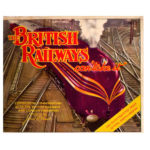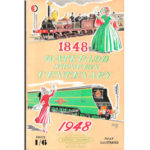Description
The official history of the Southern Railway in WWII. It has to be said that this is a rather disappointing book, which does not really due justice to the frontline role played by the Southern in transporting the BEF to France in 1938, the Dunkirk evacuation, the Battle of Britain in 1940, the Blitz in 1940/1, D-Day preparations 1943/4, flying bomb and rocket attacks in 1944/5
Bernard Richard Meirion Darwin CBE JP (7 September 1876 – 18 October 1961) a grandson of the British naturalist Charles Darwin, was a golf writer and high-standard amateur golfer.
After Cambridge, Darwin became a court lawyer but did not particularly enjoy that career, and gradually moved into journalism, despite having no formal training. He covered golf for The Times from 1907 to 1953 and for Country Life from 1907 to 1961, the first writer ever to cover golf on a daily basis, instead of as an occasional feature.
He played the game at an excellent level himself well into middle age, and competed in The Amateur Championship on 26 occasions across five decades between 1898 and 1935, with his best results being semi-final appearances in 1909 and 1921. In 1922, while in the United States to report on the first Walker Cup amateur team match between Britain and Ireland and the U.S., and also appointed as non-playing captain, Darwin was pressed into service at the last minute as a player, when one of the British team members, Robert Harris, was unable to play. He lost his team match, but won his singles match.
Darwin was no doubt an amiable old gentleman (he was 69) but he admits to having little knowledge if railways, and the only railway contact which he had previously seems to have been a commission to write “A Round of Golf on the London & North Eastern Railway”.
How he came to be commissioned to write this important work is a mystery, although I have a strong suspicion that something like the scenario below took place. During my railway career I was present on several occasions when art, feature articles and booklets were commissioned on the same spur of the moment casual basis.
The scene is the smoking room of a West End Club, just after VE Day – probably the Carlton, much favoured by railway company directors and chief officers of the Conservative persuasion. Lt .Col. Eric Gore-Brown, Chairman of the Southern Railway, is enjoying a post dinner brandy with Sir Eustace Missenden when a thin faced man with a large nose and prominent ears passes by.
“Bernard!” says Gore-Brown “you getting any golf in yet?”
“Not really, Eric, too many courses are still “Dig for Victory” allotments, and travel to the USA is virtually impossible”.
“Hmm. At a bit of a loose end, eh? Do you know Missenden, my General Manager?
(Hands are shaken) “Join us for a drink?” When the waiter has gone, Gore-Brown gets down to business.
“Eustace and I have been discussing the possibility of commissioning a history of the Southern during the late unpleasantness. Would you be interested?
“Eric, I know very little about railways, it is really rather outside my field…
“Nonsense. You are in The Times nearly every day.”
“Yes but golf and Dickens and the odd fourth leader”.
“Oh you will be fine, we will give you someone to assist, provide lists of questions to ask and so on. Eustace, can you get your PR chap Grasemann to contact Bernard, take him to lunch settle a fee and get things moving.”
“If you say so, Chairman.”
Thus a 69 year old is sent on a tour of the war ravaged Southern, where daily travel is a nightmare, trains break down, are cancelled or run very late, armed with lists if questions which he barely understands . The result is somewhat ramblng, discursive sometimes repetitve and not too easy to read.
It is a pity because the book could have been so much better. The LNER’S “By Rail to Victory” which we will be offering soon, showed how the job should be done.





Reviews
There are no reviews yet.